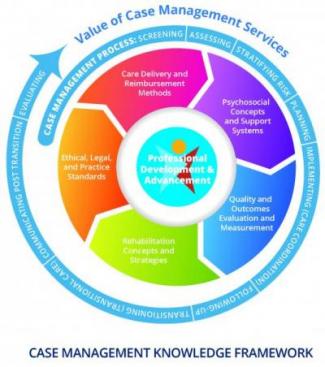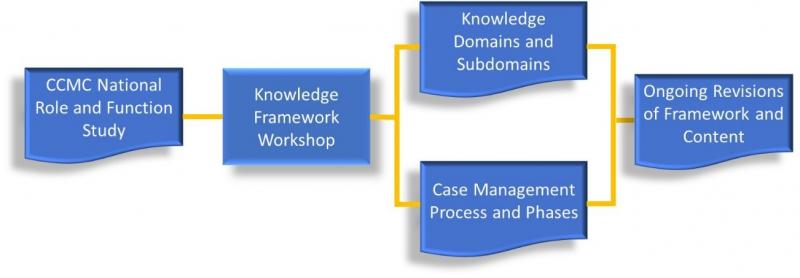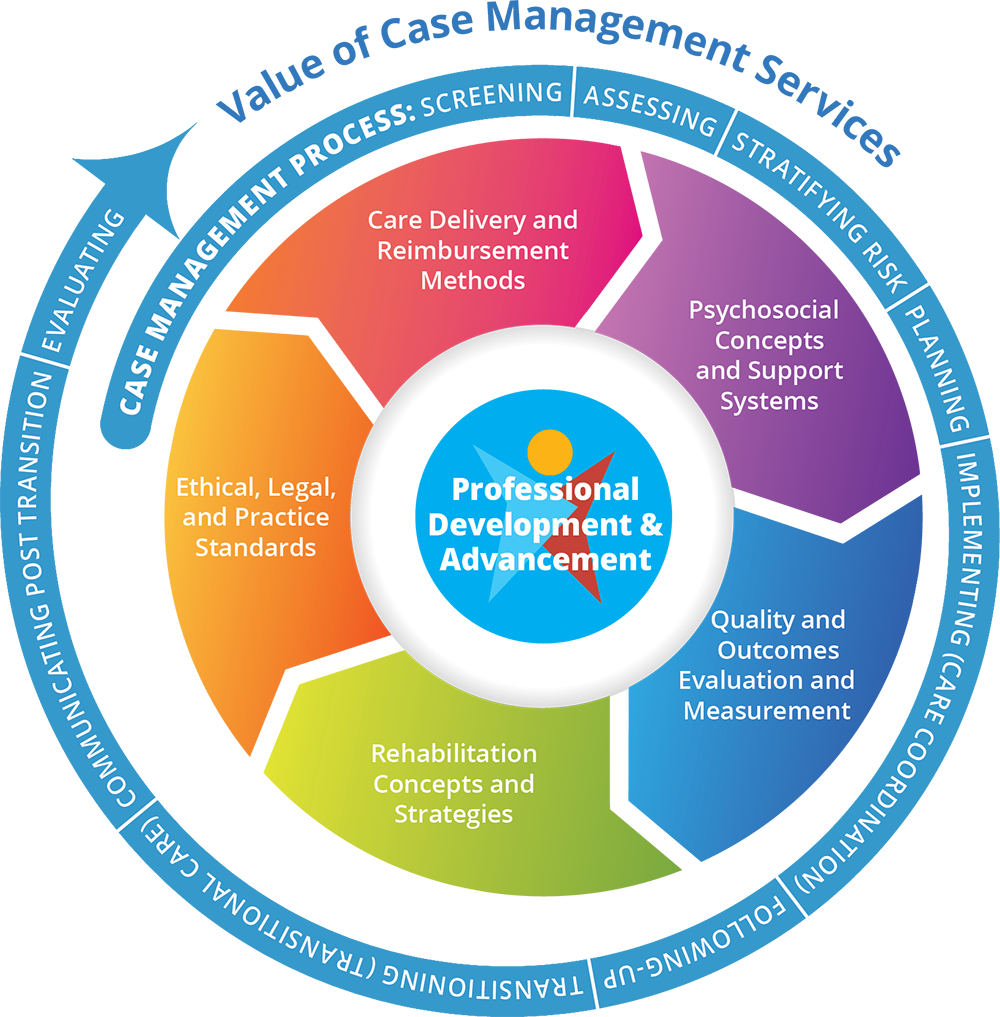About the Commission for Case Manager Certification’s Case Management Body of Knowledge® (CMBOK®)
The knowledge, skills, abilities, and competencies of case managers are major factors in assuring the provision of safe and superior quality healthcare services to clients and their support systems, including their families, significant others, friends, caregivers, and others. The more current case managers are, the more they are able to demonstrate effectiveness in their case management practice and achieve desired outcomes.
To realize its mission to advance the practice of case management, the Commission for Case Manager Certification (the Commission) developed a case management knowledge framework for case managers and other healthcare professionals directly or indirectly involved in case management practice and across the continuum of health and human services and care settings.

Case management professionals may apply the knowledge framework in their efforts to realize multiple purposes, including the following:
- To enhance the structure and outcomes of case management programs in the various practice settings across the health and human services care continuum
- To guide the professional development and advancement of case managers and other professionals
- To effectively design roles, responsibilities, and competencies of case managers in various practice settings and with varying professional backgrounds
- To use credible and widely recognized professional case management standards and practices
- To demonstrate the value of case management programs, roles, and functions
- To assist in the ongoing education and training of experienced as well as new case managers
- To develop academic programs for education of healthcare professionals in the field of case management
- To use as background information on which credentialing and accreditation activities can be based
This case management knowledge framework is called the CMBOK. Unlike any other resource in the industry, the CMBOK is the only comprehensive body of knowledge that is peer-reviewed and available online for case managers and other healthcare professionals.
Definition of Body of Knowledge
Body of knowledge (BOK) is a term used to describe widely recognized information, standards, methods, tools, and practices about a specific field such as case management. A BOK usually includes a comprehensive set of concepts, terms, tools, and activities that apply to a profession, as defined by a relevant professional society (Babylon Online Dictionary).
- While the term body of knowledge is used to describe the document that defines that knowledge, the BOK itself is a dynamic reference that is more than simply a collection of terms and concepts, a professional reading list, a library of references, a website or collection of websites, a description of professional functions, or even a collection of information (Project Management Institute, 2008; Wikipedia, Body of knowledge, 2010).
- A BOK is a prescribed aggregation of essential knowledge in a particular field or specialty that an individual within the field is expected to have mastered to effectively practice and be considered a practitioner within the specialty.
Based on the definition of the term body of knowledge above, the Commission defines the CMBOK as “a comprehensive resource of essential knowledge in the field of case management that a case manager is expected to master and become knowledgeable, skilled, as well as experienced in, to effectively care for clients and their support systems and be considered a competent case management practitioner.”
Definition of Case Management Body of Knowledge (CMBOK)
The CMBOK provides case managers and other healthcare professionals with a comprehensive online resource based on a clearly defined knowledge framework for the field of case management. The CMBOK:
- Reflects generally accepted principles and practices for case managers and other healthcare professionals across various practice settings and professional disciplines.
- Is an aggregation of essential information that describes what a case manager needs to know and be able to do effectively and competently for the primary benefit of clients (consumers of healthcare services) and their support systems.
For case managers and other healthcare professionals who desire to have appropriate, reliable, and current information to support case management activities, the Commission’s CMBOK provides an online knowledge resource on all key case management processes and essential knowledge domains.
The CMBOK is a dynamic reference and is intended to expand and be updated and peer-reviewed on an ongoing basis to keep it relevant, reliable, credible, and cutting-edge.
Updates will be based on scanning the professional case management and other related literature, recommendations of case management experts, latest findings from relevant practice analysis/role and function study research, and feedback from the CMBOK users and editorial board members.
The case management framework relates the skills and knowledge needed with the activities and processes that a case manager performs on the job. For the Case Management Process (described in the Introduction to the Case Management Knowledge Framework section) and each of the knowledge domains (listed in the framework graphic on the home page), the CMBOK provides:
- A short description.
- A summary of each domain to provide an overall understanding of what the domain is, including key information on generally accepted case management practices.
- A summary of the Case Management Process to provide an overall understanding of what the process is about, including key information on generally accepted case management practices.
- Expanded information on case management knowledge topics (domains, subdomains, process, and phases of the process). This work addresses how a topic relates to the competent and effective practice of case management and will continue to expand over time to provide deeper, richer content for all case managers.
Who Developed the CMBOK
The process of developing the framework for case management knowledge began with a panel of subject matter experts (SMEs) that met regularly and developed the framework under the guidance of a case management researcher and expert in creating knowledge frameworks and conducting practice analysis research. To ensure the reliability, appropriateness, and relevance of the CMBOK, SMEs were selected based on specific qualification criteria such as:
- Years of experience
- Areas of practice
- Health disciplines
- Professional specialization
- Educational background
- Geographic location
- Diverse experience and perspectives
- Active involvement in the field of case management
- Engagement in scholarly activities
The SMEs represented various backgrounds (e.g., nurses, social workers, vocational rehabilitation counselors, and behavioral health specialists), case management practice settings (e.g., acute care, health insurance, government/veterans administration, private practice, rehabilitation), and U.S. geographic regions.
Through a think-tank workshop format in October 2009, the SME panel reviewed the findings from the Commission’s 2009 National Survey of Roles and Functions of Case Managers. Nearly 7,000 case managers from across all of the U.S. regions participated in the study. The case manager’s role and function study resulted in a comprehensive description of case management practice at the time. It delineated the primary roles and functions of case managers in various practice settings and identified key knowledge areas required for effective and competent performance of case managers.
Using findings from the study, the SMEs determined the implications of the findings for case management practice, education, and professional development. Then they reached consensus on the essential domains and subdomains of case management knowledge, numerous specific knowledge topics, and nine major phases in an overall Case Management Process. These elements formed the case management knowledge framework.
Developing the Case Management Framework

The Commission followed a rigorous development process that reflects best practices, engaging professionals both in case management and in product development. The CMBOK reflects the input of many people from within and outside the Commission’s community of case managers who defined the framework and contributed to the development of the CMBOK knowledge content. These experts consisted of the following:
- A panel of SMEs across a range of professional disciplines and practice settings
- A knowledge editor – Hussein Michael Tahan, PhD, RN, FAAN, FCM
- A robust Customer Advisory Panel (CAP) – practicing case managers, supervisors of case managers, and others directly or indirectly involved in professional case management practice, representing the mix and variety of disciplines, experience, and practice settings within the case management profession
- Professional writers and copy editors
- Peer reviewers
- Product development, information design, and web development professionals
- The Commission's leadership, including volunteer members of the new product development task force and the sitting commissioners
These individuals provided input over the course of more than a year to help define and guide the initial creation of the CMBOK so that it reflected the needs of the overall case management community. Some continue to be involved in expanding the knowledge content and/or enhancing the product design.
Ongoing Updates
The Commission recognizes the importance of ongoing review and improvement to ensure that the CMBOK remains current and reflects the latest knowledge and practices of case management.
- In 2018, the CMBOK framework was updated to reflect the findings of the practice analysis research the Commission conducted in 2014 and published toward the end of 2015 and early 2016 in a peer-reviewed case management journal.
- It is the intent of the Commission to continue to review and update the CMBOK and its relevance to the practice of case management. A formal update is usually performed every time the Commission completes practice analysis research, which is proactively scheduled based on a 5-year cycle.

- Psychosocial Concepts and Support Systems
- Psychosocial Aspects of Care
- Social Determinants of Health
- Pyschosocial Concepts & Support Systems Overview
- Shared Decision-Making
- Quality and Outcomes Evaluation and Measurement
- Value and Return on Investment Outcomes
- Quality
- Accreditation
- Risk Management
- Quality and Outcomes Evaluation and Measurement Overview
- Rehabilitation Concepts and Strategies
- Vocational Rehabilitation
- Essentials of Workers' Compensation
- Disability Case Management, Catastrophic Case Management, and Life Care Planning
- Rehabilitation Concepts and Strategies Overview
- Ethical, Legal and Practice Standards
- Ethical Standards for Case Management Practice – Part I: Review of the CCMC Code of Professional Conduct for Case Managers
- Ethical Standards for Case Management Practice-Part II: Practice Considerations for the CCMC Standards for Professional Conduct
- Legal Issues and Professional Case Management
- Legal Issues Related to Case Management Practice
- Understanding Diversity, Equity, and Inclusion (DEI) in Case Management Practice
- Interventions in Case Management Practice to Amplify Diversity, Equity, and Inclusion (DEI)
- Care Delivery and Reimbursement Methods
- Case Management Concepts
- Principles of Practice
- Healthcare Management and Delivery
- Healthcare Reimbursement
- Communication Skills of the Case Manager
- Case Management Administration and Leadership
- Motivational Interviewing
- Transitions of Care
- Care Coordination
- Case Management Programs and Models
- Utilization Management
- Wholistic Case Management
- Professional Development and Advancement
- Value of Case Management (Intro to CM)
- Professional Development and Advancement Domain: Value of Case Management Part II - Approach
- Professional Development and Advancement Overview
- Case Management Process
- Screening
- Assessing
- Stratifying Risk
- Planning
- Implementing (Care Coordination)
- Following-Up
- Transitioning (Transitional Care)
- Communicating Post Transition
- Evaluating
- Case Management Process Overview




